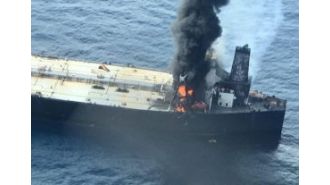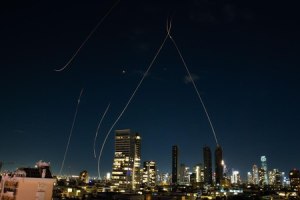Iran's role as a potential instigator of World War III is becoming increasingly concerning as tensions escalate.
Tensions in Levant highlight Iran as potential instigator of global conflict.

Recently, there has been a significant escalation in violence in the Middle East, with multiple countries experiencing unrest and tensions rising to a boiling point. This has led to fears of a potential World War Three, as the region becomes increasingly unstable. One of the key players in this volatile situation is Iran.
The country has been at the center of recent aggressions in the Levant, and its actions have caused concern among Western governments. In response, the UK government recently announced sanctions on several individuals and organizations linked to Iran, citing them as a threat to national security. However, some experts warn that these measures may not be enough to stop Iran's aggressive behavior.
Alicia Kearns, Chair of the Foreign Affairs Select Committee, believes that a more comprehensive approach is needed to address Iran's actions, which include nuclear aspirations, support for proxies in Syria, Iraq, and Yemen, and involvement in transnational repression and terrorism. Behnam Ben Taleblu, a Senior Iran Analyst, shares this concern and believes that Iran thrives on chaos and instability in the region. He argues that while Western countries need stability to achieve their goals, Iran benefits from the chaos and uses it to further its own interests.
The situation in the Middle East has also had far-reaching consequences, with conflicts and tensions affecting other parts of the world. For example, Iranian-backed Houthi rebels have been targeting shipping vessels in the Red Sea, leading to the deployment of warships by the US and UK. This has raised questions about regional stability and the need for a united response from Western allies.
In addition, the ongoing conflict in Gaza, with Israel bombarding the strip and causing numerous casualties, has reached a breaking point. Ms. Kearns points out that while the UK may be suffering, our allies in the region, such as Jordan and Syria, are facing even greater challenges.
She also highlights Iran's role in using this conflict as a recruiting tool for terrorism, rather than having any genuine concern for the people of Palestine. Iran's involvement in other countries extends beyond the Middle East, with allegations that they have supplied Russia with drones to attack Ukraine. This has further demonstrated the power and influence of the Islamic Revolutionary Guard Corps (IRGC), which is responsible for many of Iran's aggressive actions.
It is clear that Iran's actions pose a significant threat not only to the stability of the Middle East but also to the rest of the world. Groups like Hezbollah, which are funded by Iran, have even targeted British citizens, forcing a London-based television channel to move its operations to America due to threats from Iranian agents. While sanctions are a welcome step, it is essential for the UK government to have a clear goal in mind when implementing them.
As Ms. Kearns states, it is crucial to determine whether the aim is to weaken Iran's power, prevent them from obtaining nuclear weapons, or limit their ability to support proxies and cause chaos in the region. In conclusion, the situation in the Middle East is complex and multifaceted, with Iran playing a significant role in the region's instability.
It is crucial for Western countries to take this threat seriously and work together to address Iran's aggressive actions before they lead to further conflict and instability. As Mr. Taleblu warns, downplaying or ignoring this issue could have severe consequences, as seen in countries like Ukraine.










